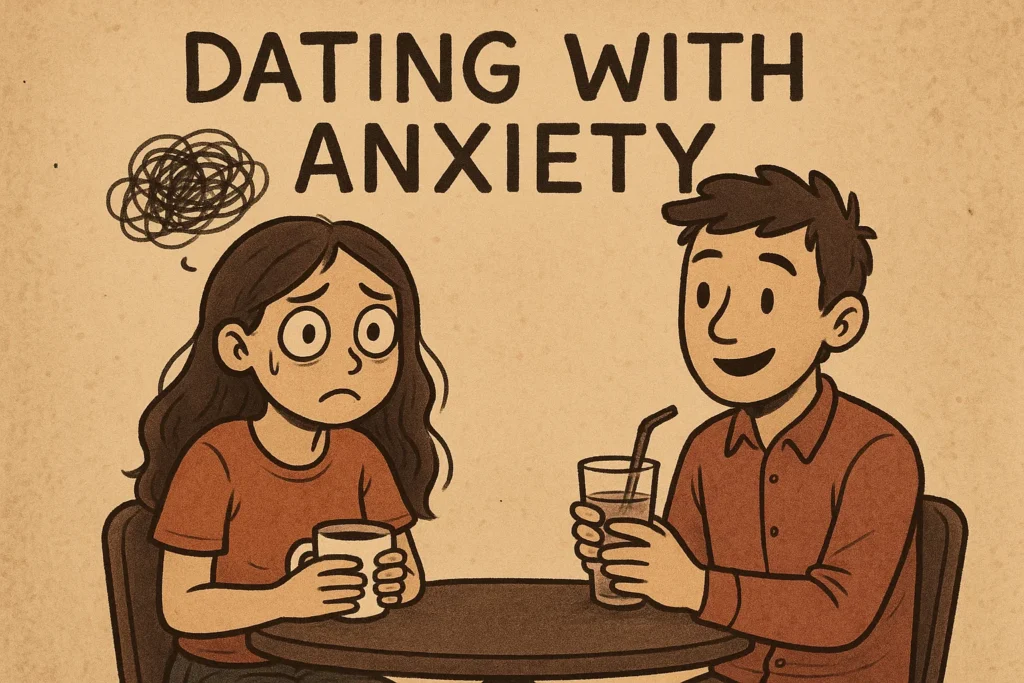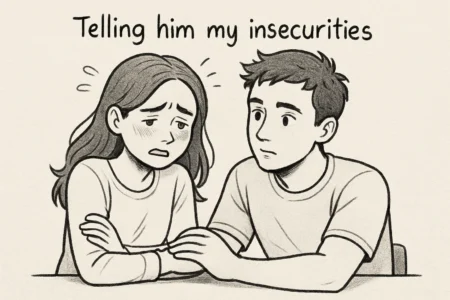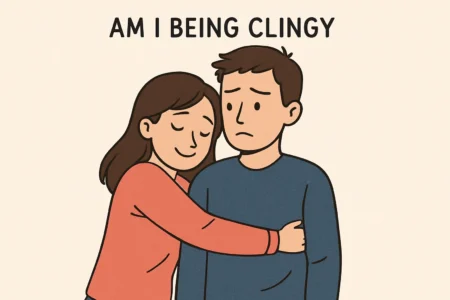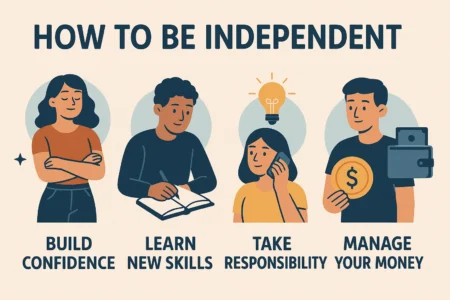The phone lights up. A new message. Your heart does that painful, familiar little jump. Part thrill, part oh-no-what-now. It’s from someone you’re interested in, someone you might actually go on a date with. Right then, your brain kicks into high gear. This isn’t just butterflies; it feels more like a swarm of angry wasps. Your palms get slick. Your breathing gets tight. The text is simple: “Hey, what are you up to?” And your mind translates it into a thousand-page interrogation.
If this sounds familiar, welcome. You’re in the right place.
Wanting connection is… well, it’s human. But when you live with anxiety, that basic need gets tangled in a barbed-wire fence of “what ifs” and worst-case scenarios. The very thing you want—love, a partner—requires being vulnerable. And for an anxious mind, “vulnerability” feels less like a strength and more like walking into a bear’s den covered in honey.
It’s a cruel joke, really. I’m here to tell you that dating with anxiety isn’t a life sentence of being alone. This isn’t about “curing” yourself before you’re “allowed” to date. It’s about learning to navigate the choppy waters with the anxiety. This is a survival guide from someone who’s been in the trenches, done that, and somehow survived the dreaded “K” text.
More in Self-Worth and Insecurities Category
A Few Truths Before We Start
So before we really get into it, I want to get a few things on the table. If you remember nothing else from this, let it be these truths:
- That anxious voice in your head? It’s a terrible fortune-teller. Its predictions are almost always wrong and always, always catastrophic.
- Your feelings are completely valid, but they aren’t always facts. You can feel like you’re being a total weirdo, but that doesn’t mean you are.
- A good pre-date routine isn’t about controlling the situation; it’s about making yourself more comfortable.
- You don’t have to “fix” yourself to be worthy of love. The right person will see all of you, anxiety included, and be happy to be there.
- Your single greatest weapon in all of this? Learning to be kind to yourself. You have to learn to be your own advocate.
So, Why Does My Brain Go Into Overdrive When I Just Think About Dating?
It’s a completely fair question. Why does something that’s supposed to be fun feel like a high-stakes exam you didn’t study for?
The short answer? Biology.
Your brain is wired for one thing: survival. Not for navigating Tinder. Deep inside, you’ve got this tiny, almond-shaped security guard called the amygdala, and its only job is to scan for threats. This system was great for our ancestors; it kept them from being eaten by saber-toothed tigers. That same system fires up for you when you face a different, more modern kind of threat: rejection. Judgment. The unknown.
Dating is the perfect storm of all three. You’re putting your true self on the line, hoping someone else will like what they see. To your anxious brain, the potential “no” feels just as dangerous as that tiger. So, it floods your system with adrenaline and cortisol, prepping you to either fight, flee, or freeze.
This explains why you can be a confident, capable person at work, but the second you open a dating app, you feel like a terrified, awkward teenager. It’s a threat response. And it’s exhausting.
Is This Just “Normal” Nerves or Something More?
Look, people throw the word “anxiety” around a lot. But it’s important to know the difference between “butterflies” and “bats.”
Butterflies are normal. That’s the fluttery, excited, anticipation. It’s a little tingle. You’re nervous, sure, but you’re also excited.
Bats are… a whole different beast. That’s the chaotic, flapping, dark-cloud-in-your-stomach feeling. It isn’t excitement; it’s dread. It’s what comes with a racing heart, shallow breathing, or that tight knot of nausea. Butterflies can co-exist with a “what if this goes well?” mindset. Bats only scream, “What if this all goes wrong?”
In short: yes. Absolutely.
We aren’t blank slates. Our past experiences—with parents, with friends, with our first-ever crush—create a blueprint in our minds for how relationships are supposed to work. Psychologists call this “attachment theory.”
If you grew up with inconsistent care, you might have an “anxious attachment” style, constantly seeking reassurance and fearing abandonment. If you were taught to be hyper-independent, you might have an “avoidant” style, pulling away when things get too close.
You don’t need a PhD to see how this plays out in dating. If you’re anxiously attached, an unreturned text message doesn’t just mean “they’re busy.” It means “they’re leaving me, I knew this was too good to be true, it’s all over.” Your past is whispering (or shouting) in your ear, telling you a story that might have nothing to do with the present. Recognizing these patterns is the first step to breaking them. Understanding your attachment style can be a lightbulb moment, and there’s a useful overview of attachment styles from Harvard Medical School’s health blog that simplifies the concept.
I’m About to Go on a Date. Why Do I Suddenly Want to Fake My Own Death?
The date is set. It’s in the calendar. And suddenly, the dread sets in. That outfit you loved now looks ridiculous. You’re convinced you have nothing interesting to say. The urge to text “Hey, so sorry, my car/cat/entire apartment building just exploded, gotta cancel!” is overwhelming.
This is your anxiety’s self-preservation mode. It’s that “flee” response. If you don’t go, you can’t be rejected. Simple.
I remember this feeling all too well. I was getting ready for a second date with a guy I was genuinely excited about. And an hour before I had to leave, I found myself sitting on a literal mountain of discarded clothes, crying. Why? Because I was convinced that if I didn’t pick the perfect outfit, one that said “I’m fun, but not too fun, smart, but not intimidating, sexy, but not ‘trying too hard,'” that he would instantly see me for the “fraud” I was.
I’d tried on 10 outfits. I hated them all. I was hot, sweaty, and on the verge of canceling. My brain was screaming at me that staying home, where it was safe, was the only logical choice.
How Can I Stop “What If-Ing” Myself Into a Panic?
This “what-if” spiral is called catastrophizing. It’s taking a small, possible negative (e.g., “What if we have nothing to talk about?”) and blowing it up into an absolute disaster (“It will be awkward, he’ll think I’m boring, he’ll tell all his friends, I’ll be humiliated and die alone.”)
So, here’s a trick. Play the tape all the way through.
- You: “What if they don’t like me?”
- Yourself: “And then what?”
- You: “Then I’ll be disappointed and feel rejected.”
- Yourself: “And then what?”
- You: “Then… I’ll go home. I’ll watch my favorite show. I’ll text my best friend about it. I’ll feel a bit crummy, but I’ll wake up tomorrow and be… fine.”
When you play the tape to its logical conclusion, you realize the “disaster” is almost always survivable. The unknown is terrifying. The known, even if it’s disappointing, is manageable. You have survived every single bad date, awkward silence, and rejection so far. You’ll survive this one, too.
Are There Any Practical Things I Can Do to Feel Calmer Right Now?
Yes. You don’t have to just white-knuckle it. Create a pre-date ritual that is about comfort, not perfection.
- The 5-4-3-2-1 Method: This is a classic grounding technique. Right now, wherever you are. Name 5 things you can see. 4 things you can feel (your feet on the floor, the fabric of your shirt). 3 things you can hear. 2 things you can smell. 1 thing you can taste. This yanks your brain out of the future (the “what-ifs”) and plants it firmly in the present.
- Set a Time Limit: Go on a date with a built-in escape hatch. “I can meet for a drink at 7, but I have to be up early tomorrow, so I can only stay an hour.” This does two things: it gives you a clear end point, making it feel less overwhelming, and it gives you a polite out if it’s not going well.
- Have a “Go” Outfit: Forget the perfect outfit. Find one comfortable outfit. One that you know fits well, that you’re not tugging at all night, that makes you feel like you. Make it your designated “first date” uniform. It removes one massive variable.
- Listen to Your Hype-Up-Playlist: Or a funny podcast. Or call a friend who always makes you laugh. Flood your brain with positive, familiar, comforting sounds before you leave.
That night with the mountain of clothes? I eventually just grabbed a pair of jeans, a simple top, and a leather jacket. I was still anxious. But I went. And I was fine. (He didn’t even notice the outfit, by the way. He just said, “You look great. Ready?”)
During the Date: “Am I Being Weird? I’m Being Weird.”
You made it. You’re here. You’re sitting across from the person. And your mind is… completely blank.
Or worse, it’s not blank at all. It’s running a constant, critical commentary: “Don’t fidget. Why did you say that? That was a weird laugh. They just looked at their phone, they’re bored. You’re being weird. Stop being weird.”
This is the curse of dating with anxiety. You’re not actually on the date. You’re one step removed, hovering over your own shoulder, monitoring your performance. You’re so busy trying to seem interesting and normal that you forget to just be present.
How Do I Stop Over-Analyzing Everything I Say?
The antidote to self-consciousness is curiosity.
When your brain starts that critical monologue, you have to force it to change direction. Turn the spotlight around. Instead of focusing on yourself and how you’re being perceived, get genuinely curious about the person in front of you.
Ask open-ended questions. Not a rapid-fire interrogation, but a real conversation.
- Instead of “Do you like your job?” try “What’s the most interesting problem you had to solve at work this week?”
- Instead of “Where are you from?” try “What’s one thing you miss (or don’t miss) about your hometown?”
- Listen to their answer, really listen, and find the next thread. “You mentioned you love hiking. What’s the best trail you’ve ever been on?”
People love to talk about themselves to someone who is genuinely interested. And the best part? While you’re busy being interested in them, you have less mental bandwidth to worry about yourself. You get out of your head and into the moment.
What If I Get a Panic Attack on the Date?
This is the big fear, isn’t it? The ultimate loss of control. First, take a breath. The chances of a full-blown panic attack happening are low, but if it does, you have a plan.
- The Bathroom Escape: This is your easiest out. “Excuse me, I’ll be right back.” Go to the bathroom. Lock the door. Put your hands on the sink, look in the mirror, and breathe. In for four, hold for four, out for six. Run cold water over your wrists. This can help “shock” your system back to baseline.
- The Honesty Card: This one is braver, but it can be incredibly effective. “Wow, I don’t know why, but I’m suddenly feeling really anxious. I’m just going to take a few deep breaths.” You’d be shocked at how many people respond with “Oh my gosh, me too,” or “No problem, take your time.” It makes you human.
- The Grounding Grab: Under the table, grab your own arm and squeeze, hard. Or, press your feet flat on the floor and focus on the sensation. Wiggle your toes. Name three things you see on the table. It’s that 5-4-3-2-1 trick again, but stealthy.
It’s about having a toolkit. Just knowing you have a plan can often be enough to prevent the panic from taking hold in the first place.
The Aftermath: The Agonizing Wait
The date is over. You said goodnight. You’re home.
And now, the real torture begins. The void.
An anxious mind hates a void. It despises ambiguity. And the 24-48 hours after a first date is nothing but ambiguity. Your brain will immediately try to fill that void. And it will fill it with the worst-case scenarios.
You’ll replay every “awkward” moment. You’ll analyze every word you said. You’ll agonize over the fact you made that one weird joke about… whatever.
They Texted “K.” Does That Mean They Hate Me?
I once stared at a text message that just said “K.” for what I am ashamed to admit was close to an entire hour.
It was in response to me confirming a time. “See you at 7!” I’d said. “K.”
My mind exploded. My chest got tight. My breathing went shallow. Clearly, “K.” was code for “I’ve changed my mind, you’re a monster, and this date is a pity-date.” I spiraled. I re-read our entire text history. What did I say? Where did I go wrong? Was it the emoji I used three days ago?
By the time he showed up for the date (perfectly happy, by the way), I was a nervous wreck. I asked him about it later. His response? “What? Oh. I was in a meeting. Just wanted to let you know I saw it. Why?”
This is “mind-reading.” It’s another fun trick our anxiety plays, where we assume we know exactly what someone else is thinking, and it’s always bad.
Here’s the truth: “K.” can mean “I’m busy.” “K.” can mean “I’m a bad texter.” “K.” can mean “My phone’s about to die.” It almost never means “I have developed a deep-seated hatred for you in the last 30 seconds.”
How Do I Stop Myself From Checking My Phone Every 30 Seconds?
You have to create a “post-date” containment plan. Your job is to not let your anxiety drive the bus.
- Mute Their Notifications: This is a lifesaver. You can still check your messages, but you get to decide when. You’re not at the mercy of every “ding” and “buzz,” which sends a fresh jolt of adrenaline every time.
- Set “Check-In” Times: Treat it like a work email. Vow to only check your phone once an hour. Or once every 90 minutes. It gives your brain a boundary.
- Get Engaged in Something Else: Don’t just “distract yourself” with mindless scrolling. That doesn’t work. You have to do something that requires your full, undivided attention. Play a complex video game. Follow a difficult recipe. Call your mom and ask about her day. Clean out that one closet you’ve been avoiding.
- Give Your Phone to a Friend: A bit extreme, but it works. “Do not let me have this for two hours, I don’t care what I say.”
The goal is to survive the ambiguity. The right person will make themselves clear. You don’t have to decode their every comma.
The “Big Talk”: When (and How) Do I Mention the Anxiety?
Okay. You survived the first few dates. You… actually like this person. And they seem to like you.
Now comes the next hurdle. The “DTR” (Define The Relationship) is one thing. But for us, there’s the “DTA”—Define The Anxiety. When do you tell them? How do you say it? What if it scares them off?
I Like This Person. But When Do I Tell Them I’m a “Mess”?
First, let’s stop right there. You are not a “mess.” You are not “broken” or “too much.”
You are a whole person who has anxiety. It is a part of you, like your eye color or your terrible taste in action movies. It is not the sum of you.
So, stop thinking of it as a confession. It’s not a dirty secret. It’s just… information. You’re sharing a part of your user manual.
But Seriously, What’s the “Right Time”?
There is no perfect time, but there are definitely bad times.
Bad Times to Share:
- On the first date. It’s just too much, too soon. A first date is for light, breezy “do we even vibe?” conversation.
- Via text. This is heavy, emotional information. It deserves a face-to-face (or at least a phone call) conversation.
- In the middle of a panic attack. This is the worst. It’s like handing someone a grenade, pulling the pin, and saying “Here, hold this!” It’s scary for them and unfair to you.
- In the middle of a fight. It should never, ever be used as a weapon or an excuse. (“I’m only yelling because of my anxiety!”)
A Good Time to Share: A good time is when you’re both calm, connected, and it feels like the relationship is moving from “casual” to “meaningful.” It’s when you’re sharing other vulnerable things—fears, dreams, a story about your childhood.
It’s a “cuddle on the couch” conversation, not a “table at a loud restaurant” conversation.
What Do I Even Say? “Hi, I Have Anxiety, Don’t Run”?
It’s all about the script. Having one ready can take the fear out of it.
I remember when I did this with my now-partner. My hands were shaking. I was convinced this was the “I’m too much” moment.
I said something like: “Hey, there’s something I want to share, because I really like you and I want to be open. I have an anxiety disorder. For me, that just means that sometimes my brain… kind of short-circuits.”
And then, I gave concrete, non-blaming examples.
- DO SAY: “Sometimes I overthink text messages. So if I ever ask for reassurance, it’s not because I don’t trust you, it’s just my brain being loud, and a simple ‘we’re good!’ helps a ton.”
- DO SAY: “Big, crowded, noisy places can be really overwhelming for me. It’s not that I don’t want to go, but I might need to step outside for a minute or hold your hand.”
- DON’T SAY: “You’re going to have to deal with my panic attacks,” or “You need to text me back right away or I’ll freak out.”
See the difference? The first set is about you and your experience. The second set is a demand.
What If They React Badly?
When I finished my little speech, I held my breath.
And my partner just… nodded. He said, “Okay. Thanks for telling me. That sounds really hard. What’s the best way for me to support you when you feel like that?”
I nearly burst into tears. It was that simple.
But what if they don’t? What if they get weird? What if they do run?
It will hurt. I won’t lie. It will feel like every fear you’ve ever had is being confirmed.
But here is the truth: That is a gift.
If someone runs when you share a vulnerable, real part of yourself, they have just done you a massive favor. They have filtered themselves out. They have shown you that they are not emotionally equipped for a real, deep, adult relationship. You just dodged a bullet. The right person won’t be scared off by your reality. The right person will lean in.
Okay, We’re Together. Does the Anxiety Just… Go Away?
Oh, I wish.
No. It doesn’t. In fact, it often just shapeshifts.
The anxiety of “will they like me?” is replaced by the anxiety of “will they leave me?” It’s a new level of vulnerability, and your anxiety will find new ways to act up.
This is where the real work begins. It’s about building healthy habits, both for you and for the relationship.
Here’s a quick list.
- HEALTHY ANXIETY HABITS:
- Voicing a fear clearly: “Hey, my brain is telling me a weird story that you’re mad at me. Can I get a quick reality check?”
- Maintaining your own life: Continuing to see your friends, have your hobbies, and be your own person. Your partner is part of your life, not your whole life.
- Using “I feel” statements: “When the plan changed at the last minute, I felt anxious,” (Good) vs. “You made me anxious when you changed the plan.” (Bad).
- UNHEALTHY ANXIETY HABITS (Beware!):
- Constant reassurance-seeking: Asking “Are you mad at me?” 10 times a day. It’s draining for them and it never actually fixes the anxiety for you.
- Testing boundaries: Purposefully starting a fight or acting distant just to see if they’ll “fight for you.”
- Snooping: Checking their phone. This is a relationship-ending, trust-destroying-missile. Your anxiety is the problem, not their theoretical “secret.”
How Can I Be a Good Partner When My Brain Is Being So Loud?
By being a good “partner” to yourself first.
Self-compassion is everything. You will have bad days. You will have days where your anxiety wins a few battles. You will overthink a text. You will have a moment of irrational panic.
The goal is not perfection. The goal is self-awareness.
When you have one of those moments, you catch it. You own it. You say, “Wow. I’m sorry. My anxiety really got the best of me for a second. That wasn’t about you.”
Your partner’s job isn’t to “fix” your anxiety. Your job isn’t to be “cured” of it.
Your job, and theirs, is to be a team.
Dating with anxiety isn’t a flaw. It’s a filter. It will scare off the impatient, the shallow, and the emotionally unavailable. And it will leave you with the people who are kind, patient, and willing to show up.
It forces you to be vulnerable. It forces you to be a better communicator. It forces you to be brutally honest, with yourself and with your partner.
And in the end, that’s the only foundation any good relationship is built on. Anxiety or not. You’ve got this.
FAQ – Dating With Anxiety
What should I do if I start to panic during a date?
If a panic attack occurs, try using grounding techniques like the bathroom escape with breathing exercises, informing your date about your anxiety with a script, or gripping your arm or focusing on physical sensations to bring yourself back to the present.
When is the best time to tell my partner about my anxiety?
A good time to share about your anxiety is when both of you are calm and the relationship feels like it is becoming more meaningful, such as during a relaxed, honest conversation at home, not during a first date or in the middle of a panic.
How can I make my partner understand my anxiety without overwhelming them?
Be honest with clear, non-blaming explanations about your experiences and give specific examples. Use ‘I feel’ statements and avoid demands, which helps your partner understand and support you better without feeling overwhelmed.
What if my partner reacts badly to learning about my anxiety?
If your partner reacts negatively or chooses to leave, remember that their response reveals their level of emotional compatibility. The right person will lean in and support you, even with your anxiety, and their reaction can be a gift that saves you from a relationship that isn’t right.





